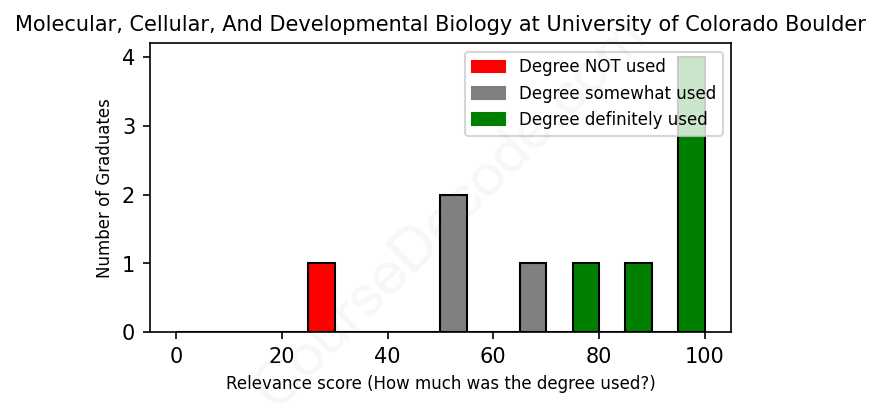
First, some facts. Of the Molecular, Cellular, And Developmental Biology graduates from University of Colorado Boulder we've analyzed , here's how many have used (or NOT used) their degree in their career:

These are estimates based on AI analysis of 10 LinkedIn profiles (see below).
The verdict? Above average. Overall, with an average relevance score of 76%, Molecular, Cellular, And Developmental Biology graduates from University of Colorado Boulder have a higher likelihood (+9%) of finding work in this field compared to the average graduate across all fields:
And for comparison, here's the chart for all profiles we've looked at across all degrees.
Also, after graduating, 60% of these graduates have pursued further education other than another Bachelor's degree (such as a Masters degree or other), compared to the average across all profiles of 35%. This suggests you may need more than just a Bachelors degree to be competitive as a Molecular, Cellular, And Developmental Biology graduate.
See the details:
|
Relevance score: 100% We think this person has gone into a career highly relevant to their degree. We think this person has gone into a career highly relevant to their degree.
DEGREE INFOGraduated in 2013 from University of Colorado Boulder with a Bachelor of Arts (BA) in Molecular, Cellular and Developmental Biology. Also pursued further education since (see below). JOB HISTORY SINCE GRADUATIONPostdoctoral Scholar University of California, Davis Jul 2018 - Nov 2019 Postdoctoral Fellow  University of California, Davis Nov 2019 - Present FURTHER DEGREES DONE SINCE GRADUATINGDoctor of Philosophy (PhD)University of California, Davis 2013 - 2018 ABOUTNo information provided. |
The top 10 most common jobs done by the graduates we've analyzed (ranked most common to least) are:
From analyzing the job history of graduates from the University of Colorado Boulder who studied Molecular, Cellular, and Developmental Biology, it's clear that many of them have gravitated towards positions that are directly related to their field of study. Common roles include research assistants, clinical research coordinators, and research services professionals, where they can leverage their understanding of biological systems. Jobs like these often demand a solid grasp of molecular and cellular concepts, allowing graduates to employ their academic knowledge in real-world applications—plus, they usually involve hands-on research and experimentation, which is a big part of the degree.
However, there are also quite a few graduates who have ended up in roles that aren’t as closely tied to their biology background. Some have transitioned into areas like business consulting, music, or photography, which don’t utilize their degree knowledge extensively. While these roles can benefit from transferable skills—like critical thinking or project management—they typically don’t require the in-depth biological expertise gained during their studies. Overall, it seems that while a significant number of graduates found work relevant to Molecular, Cellular, and Developmental Biology, others have taken a different path, showcasing the versatility of the skills they gained during their education. This mix highlights that while not everyone will stay strictly in the science field, the foundation they built can still lead to diverse career opportunities!
Here is a visual representation of the most common words in job titles for Molecular, Cellular, And Developmental Biology graduates (this is across all Molecular, Cellular, And Developmental Biology graduates we've analyzed, not just those who went to University of Colorado Boulder):

Graduates from the Molecular, Cellular, and Developmental Biology program at the University of Colorado Boulder have shown a diverse range of career trajectories. For many of them, the first job after graduation leans heavily towards research roles. Positions like Research Assistant and Research Intern are common stepping stones, with graduates often finding themselves in labs, contributing to various projects, sometimes even landing roles in prestigious institutions like the Salk Institute or the University of Colorado Anschutz Medical Campus. This initial focus on research seems to lay a solid foundation for further advancement, with some moving quickly into specialized roles, such as Clinical Research Coordinator or Clinical Assay Development Coordinator.
Looking five to ten years down the line, these graduates tend to shift toward more advanced positions, often involving management or specialized research. Some have climbed the ladder to roles like Senior Clinical Project Manager or Associate Director of Project Management, indicating that many are successfully staying within the life sciences realm. However, there's also a notable segment that branches out into less traditional career paths, such as freelancing in photography or going into business consulting. Overall, while many graduates effectively leverage their degrees into fulfilling positions within their field, there are those who choose more unconventional paths, leading to mixed outcomes in terms of relevance to their academic background. It's a mixed bag—there are definitely success stories, but not everyone sticks to the science-related careers that might have been expected.
Honestly, a Bachelor’s degree in Molecular, Cellular, and Developmental Biology can be pretty challenging, especially at a solid school like the University of Colorado Boulder. You'll dive deep into subjects like genetics, biochemistry, and cell biology, which can get pretty complex and require a lot of studying and problem-solving skills. The coursework often includes lab work too, so you’ll need to grasp both theoretical concepts and practical applications. It’s definitely demanding, but if you’re passionate about the material and are willing to put in the effort, it can also be super rewarding. Just be prepared for some tough classes along the way!
Most commonly, in the LinkedIn profiles we've looked at, it takes people 4 years to finish a Bachelor degree in Molecular, Cellular, And Developmental Biology.
Looking at these graduates from the University of Colorado Boulder, it seems like they’re on a pretty solid financial path overall, especially considering their fields. Many of them have taken on roles with research or clinical focuses, which typically offer decent pay right out of school, like the Research Assistant roles and Clinical Assay Development Coordinator job. A few have veered into creative fields, like one graduate becoming a lead guitarist and part-owning a medical evaluations company, which could be hit or miss in terms of income but shows entrepreneurial spirit. Others have moved into senior management and postdoctoral positions, which usually come with good salaries. So, while some may be starting at a lower grade, many are working their way up to pretty lucrative careers in healthcare and research.
Here is a visual representation of the most common words seen in the "about" section of LinkedIn profiles who have a Bachelor degree in Molecular, Cellular, And Developmental Biology (this is across all Molecular, Cellular, And Developmental Biology graduates we've analyzed, not just those who went to University of Colorado Boulder). This may or may not be useful:

Here are all colleges offering a Bachelor degree in Molecular, Cellular, And Developmental Biology (ordered by the average relevance score of their Molecular, Cellular, And Developmental Biology graduates, best to worst) where we have analyzed at least 10 of their graduates:
| College | Score | Count |
|---|---|---|
 University of Colorado Boulder University of Colorado Boulder
|
76 | 10 |